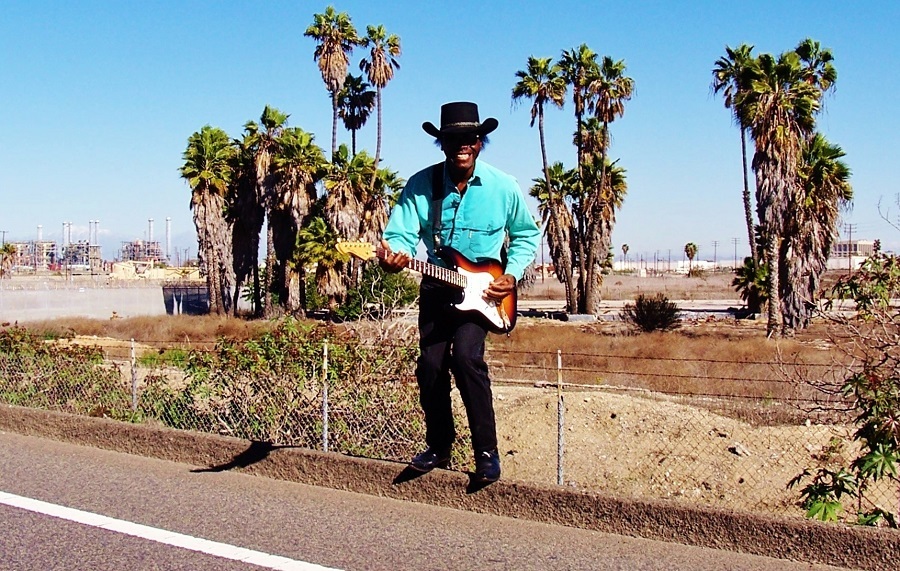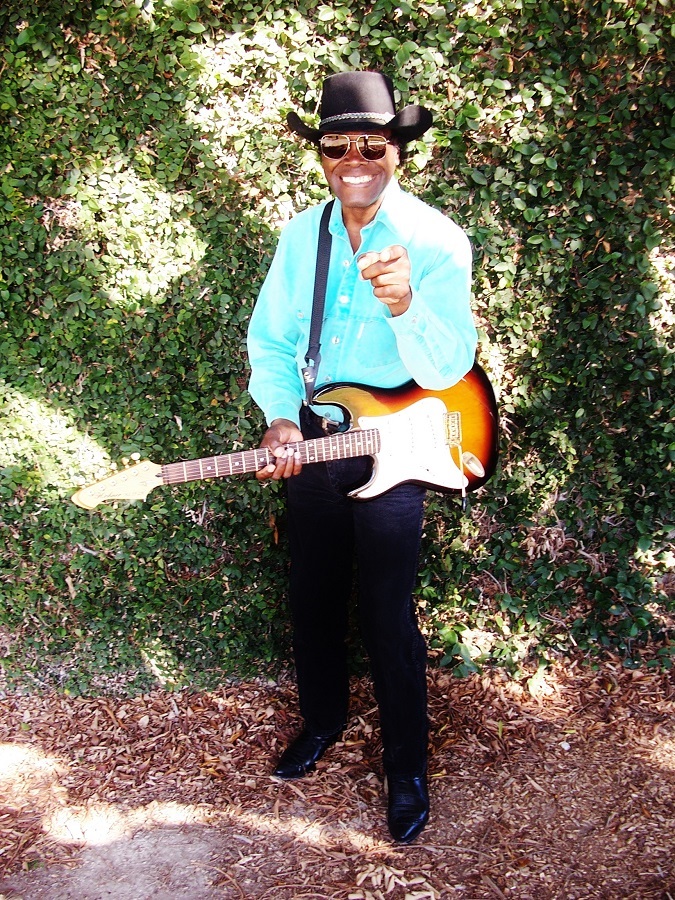
Will Glover in front of the site of the Airport Club/Marina Palace, where the Pyramids rocked the house in the early ’60s. Photo by Matt Cohn.
Surf music: that vintage branch of rock ‘n roll driven by the twangy, bendy electric guitar, the sound that evokes the southern California sun and ocean waves so perfectly.
During surf music’s heyday in the early ’60s, Long Beach was home to one of the genre’s premiere bands; The Pyramids, five uniquely talented fellas from Long Beach Poly High School who rode the surf music wave to the top.
“We were very, very lucky kids,” says guitarist/vocalist Will Glover, who co-founded The Pyramids with Poly classmate and fellow guitarist Skip Mercier.
Driven by their fearless, ambitious and ultimately shady manager, John Hodge, the Pyramids went from playing Long Beach house parties to jockeying for position on the Billboard charts with the Beatles and Beach Boys, playing their hit song “Penetration” on American Bandstand, and appearing in the Frankie Avalon/Annette Funicello surf movie Bikini Beach—-all while they were still in high school.

The Pyramids story begins under a tree at Poly High in 1962. Will Glover, an athletic sophomore living in the Naval housing on Santa Fe Avenue, had been playing guitar since age 9, and would often play it under that tree at Poly, between classes. He piqued the curiosity of Skip Mercier, who kept asking if Will would teach him some guitar. Eventually Will said yes.
Skip gravitated toward lead guitar, and learned one of the seminal surf-sounding tunes, “Walk, Don’t Run” by the Ventures. Mercier suggested that the two should form a band, so they recruited saxophonist Tom Pitman, bassist Steve Leonard and drummer Ron McMullen.
“The first Pyramids gig was in a Long Beach garage,” says Glover. “We played house parties for Poly frats (the name “Pyramids” is a spin-off on Skip’s Poly fraternity, Sphinx) and sororities, and we played the Poly, Millikan, Wilson and Jordan canteens.”
“During this time, I’d take my guitar down to Linden Beach, do a little surfing, then sit by this one trash can and play and sing. You could see a ‘V’ of people forming in front of me, trying to get real close to see and hear me,” Glover says.
John Hodge was one of the people in that beach audience. Impressed by Glover’s guitar skills and silky tenor voice, Hodge told Will he’d make him a star.
“John had a lot of ideas. He was really good at promoting—I’ll give him that,” says Will.

An early shot of the Airport Club, which became the Marina Palace in the mid-60’s. Photo courtesy of the Long Beach Press-Telegram.
Two weeks after Hodge and Glover met, the Pyramids recorded their first single, “Paul,” in a studio on Ninth Street in Long Beach. The B side was a blistering two-minute drum solo by McMullen called “Sticks and Skins.”
 “Ronnie wanted to be Gene Krupa,” says Glover.
“Ronnie wanted to be Gene Krupa,” says Glover.
“Paul” and “Stick and Skins” didn’t attract much attention, so the Pyramids went back into the studio and recorded “Here Comes Marsha,” a ballad Glover wrote that clearly reflected the influence of his favorite singer, Johnny Mathis. The B side of that record was a prototypical surf tune, “Penetration,” influenced by The Chantays’ “Pipeline” and based on a descending minor scale Steve Leonard’s mother had taught him.
“‘Here Comes Marsha’ was supposed to get radio play, but some DJ in Riverside flipped it over, and ‘Penetration’ became the hit,” says Glover.
Soon, The Pyramids found themselves sharing bills with local surf bands like The Chantays, The Challengers, Dick Dale and the Del-Tones, and the Beach Boys. Teen audiences at local clubs such as the Cinnamon Cinder on the Traffic Circle and the Airport Club on the Long Beach-Seal Beach border (which later became the Marina Palace) were dazzled by The Pyramids’ super-energetic performances.
“When we’d break into ‘The Pyramid Stomp,'” says Will, “the kids would get hyped. It was almost like punk music.”
“If you look at photos of us from those days,” says Glover, “you can see antennas on our amps. We were the first to use wireless guitars, doggone it, thanks to Steve Leonard, who was a tech wiz. We could move all over.”
John Hodge made a special point of trying to upstage the Beach Boys at every turn.
“If they arrived at a gig in limos, we’d arrive in helicopters,” says Will. “Once, we arrived on elephants.” The Beach Boys, soon to become world-wide sensations, were always good-natured about it.
The Pyramids’ wild stage antics (note gymnastics champ Skip Mercier’s backflip off the stage in the “Bikini Drag” video below) got them special attention, but when John Hodge got the idea to have the band shave its heads in defiance of the long-haired British Invasion, Hollywood heads started turning (“We weren’t mad at the Beatles, but, in my opinion, the Dave Clark Five kicked their butt,” says Glover).
The band landed a role in the 1964 surf movie Bikini Beach, which starred Frankie Avalon (in a dual role as a British musician, “Potato Bug”) and Annette Funicello. The Pyramids played songs written by two Brian Wilson collaborators; Gary Usher, who co-wrote “In My Room” and “409,” among many other early-’60s hits, and Roger Christian, who penned the lyrics to epic Beach Boys tunes like “Don’t Worry, Baby” and “Little Deuce Coupe.”
“Because I was sick, I missed the first couple of days of filming,” says Glover. “I got to the set on the third day, walked up to these two guys, and said ‘I’ve heard so much about this Frankie Avalon guy. I would really love to meet him!’ They got up and left immediately. Turns out one of them WAS Frankie Avalon! He never spoke to me after that,” says Will with a grin.
With all their success, Glover began to grow suspicious of John Hodge.
“It used to make me angry when I’d drive up in a beat-up Ford, and Hodge would drive up in a Studebaker Avanti, wearing a $500 suit,” Will says.
“The biggest downfall of the Pyramids was this,” says Glover. “One day we all went into Steve Leonard’s living room at his parents’ house, and we were supposed to get our money. It was the biggest let-down of all time when Hodge told us, ‘I spent all YOUR money.’ I broke into tears.”

Vintage longboard from the Kelli Koller collection. Photo by Matt Cohn.
“Steve and I had it all planned out,” Will says. “He was going to buy a Taco Bell, and I was going to buy a McDonald’s. You could buy a McDonald’s for $3500 back then. I was going to have that working for me, and I was going to put money down on a house for my Mom.”
The final blow to the band came a little later. “We got drafted,” says Glover. “Basically, that was the end of the Pyramids.”
Throughout the late ’60s and into the ’70s, Glover kept playing, and had some success with Skip Mercier, Steve Leonard and Long Beach musicians Mike Marchman, Jim Foelber and Chris Myers in a club band called The Family Cat. Eventually, he became disillusioned with music, quit the business, got married, and moved to a ranch in Riverside.
It was in the ’90s that Will met a woman who got him into singing country music. He began writing country tunes, and put a country album out. “I booked a show at the Crazy Horse in Santa Ana,” says Glover, “and I was amazed that the place was packed. In my last show there, I brought in the original Pyramids, and, believe it or not, it sounded just like it did in the early ’60s.”

“I’ve got the yearning again,” Will says. “Recently, I sat in with these kids—they’re called ‘Cosmic Reaction’—teenagers. They invited me up to sing “Play That Funky Music” and those kids came alive.”
Will has a new album out, The Will Glover Experience, available on Amazon, featuring a mixed bag of musical styles. “It’s totally my album, the way I wanted it,” he says. “I played all the instruments on it.” Gig-wise, Will’s back in the game, and will be playing at the Surf City Nights event on Main Street in Huntington Beach on February 16.
“It blows my mind when I look online and see bands who cite The Pyramids as an influence. I know I have a legacy,” says Glover. “I keep running into people from Long Beach who tell me things like, ‘You played my prom. You were a part of my life. You came over and talked to me.’ I was that guy. People still remember.”
Top right: The Pyramids (clockwise, from left)—Will Glover, Ron McMullen, Steve Leonard, Skip Mercier and Tom Pitman. Photo courtesy of Will Glover.
IN MEMORIAM: Ron McMullen, 1946-2015.

